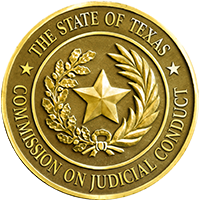Once the investigation is complete, the case is presented to the Commission for its consideration. Based on the specific constitutional provisions, statutes and canons under which the Commission operates, it considers and votes on each matter. In each case, the Complainant will be informed of the Commision's final action in writing. However, the Texas Government Code provides that the judge's name may not be stated in the correspondence to the Complainant, unless a public sanction has been issued. Likewise, in some instances, the name of the Complainant may be kept confidential.
Commission Decisions
The State Commission on Judicial Conduct has several options available when taking action on a case. The types of actions include dismissal, sanction, suspension, and the acceptance of a voluntary agreement to resign from judicial office in lieu of disciplinary action. The Commission may also initiate formal proceedings, which could result in the removal of the judge from the bench. After a thorough review of your complaint, the Commission has several options.
- Administrative Dismissal: The Executive Director administratively dismisses a case when a Complainant makes a report that fails to state an allegation of judicial misconduct.
- Dismissal: The Commission may vote to dismiss a case in which there is insufficient evidence of misconduct, or the Commission's investigation concludes that no sanctionable misconduct has occurred. All dismissed cases can be reconsidered by the Commission. The Commission describes the Reconsideration Policy in all letters of dismissal along with an explanation for dismissing the case.
- Order of Additional Education: Legal and procedural issues are often complex. The Commission may find that the judge's actions exceeded their authority or are contrary to procedural rules. In a case where the judge was misguided but not acting in bad faith, the Commission may order additional education for the judge. Orders of additional education may also be combined with private or public sanctions.
- Private Sanction: Sanctions are issued when sufficient evidence supports a finding of judicial misconduct. As it deems appropriate, the Commission uses, by order of severity, admonitions, warnings and reprimands to privately sanction judges. If the Commission votes to issue a private sanction, the appropriate order is prepared and the offending judge is served with the order and the Complainant is notified of the Commission's action. However, because the Commission is controlled by constitutional and statutory provisions that prohibit the release of information regarding investigation and resolution of a case, no other information regarding the case will be released to the public.
- Public Sanction: Sanctions are issued when sufficient evidence supports a finding of judicial misconduct. As it deems appropriate, the Commission uses, by order of severity, admonitions, warnings and reprimands to publicly sanction judges. If the Commission votes to issue a public sanction, the appropriate order is prepared, the offending judge and the Complainant are provided a copy of the order, and the order is publicly disseminated to ensure public awareness.
- Suspension: If a judge is indicted for a felony or charged with a misdemeanor involving the judge's official position, the Commission itself may vote to suspend the judge from office, with or without pay, pending the disposition of the charge under the provisions of 15(a) of the Procedural Rules for the Removal or Retirement of Judges and Article 5, Section 1-a(6)A of the Texas Constitution. The judge may request a hearing before the Commission in the event of a suspension under these circumstances.
Additionally, the Commission may request that the Supreme Court of Texas suspend a judge under the provisions of Rule 15(b) of the Procedural Rules for Removal of Retirement of Judges. Rule 15(b) states, Upon filing with the Commission of a sworn complaint charging a person holding such office with willful or persistent violation of rules promulgated by the Supreme Court of Texas, incompetence in performing the duties of office, willful violation of the Code of Judicial Conduct, or willful and persistent conduct that is clearly inconsistent with the proper performance of his duties or casts public discredit upon the judiciary or the administration of justice, the Commission, after giving the person notice and an opportunity to appear and be heard before the Commission (under the provisions of Rule 6), may recommend to the Supreme Court the suspension of such person from office.
The order of suspension and all records and proceedings relating to it will be made public.
- Voluntary Agreement to Resign: In some cases, a judge may decide to resign in lieu of disciplinary action. Upon the Commission's acceptance of the agreement, the resignation will be public and may be used in subsequent proceedings before the Commission. The Commission will notify the Complainant of the agreement.
- Formal Proceedings: In certain circumstances, the Commission may vote formal proceedings. The Commission may itself hold a trial, or request the Texas Supreme Court to appoint a special master to conduct the proceeding and report findings of fact to the Commission. The Commission may request additional evidence, dismiss the case, issue a public censure, or recommend removal. Formal proceedings and related information become public when the Commission files formal charges. The Commission itself cannot remove a judge. Under the provisions of the formal proceeding process, only the Review Tribunal may order a judge removed from the bench. The Supreme Court retains appellate authority over the decision of the Review Tribunal.
